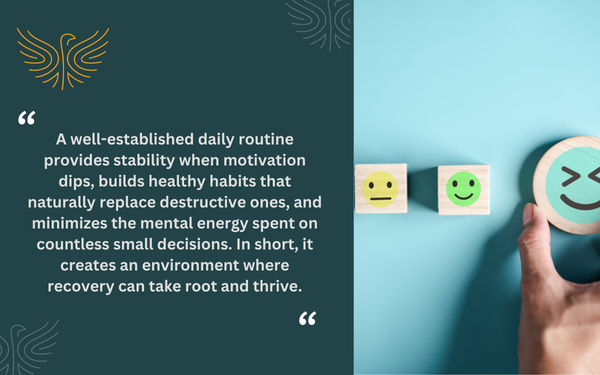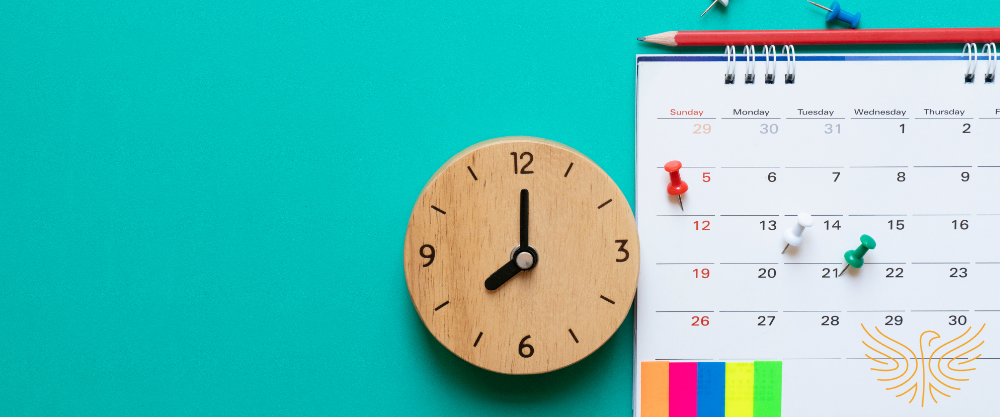Completing addiction treatment isn’t the end of the journey—it’s the start of a new chapter. But ultimately, addiction thrives off of chaos, fueled by unpredictability, idle time, and decision fatigue.
When each day feels unstructured, the mind has more room to drift back toward old patterns. But this is where a consistent routine can be undeniably powerful and prevent relapse (or, at the very least, reduce the odds of this happening!).
A well-established daily routine provides stability when motivation dips, builds healthy habits that naturally replace destructive ones, and minimizes the mental energy spent on countless small decisions. In short, it creates an environment where recovery can take root and thrive.

However, the most effective routines are personalized, flexible, and built gradually over time. They incorporate elements that support physical health, emotional stability, social connection, and personal growth. Most importantly, they transform recovery from something you’re constantly thinking about into something you’re actively living each day.
_______________________________________________________
Benefits of Daily Routines in Preventing Relapse
During rehab, such as throughout any program at Freedom Recovery Centers (FRC), a structured routine is built into daily life. But routines have their place beyond rehab. This consistency offers several key advantages during recovery, including:
Reduces Decision Fatigue and Stress
By automating daily choices about when to wake up, eat, exercise, and sleep, routines preserve mental energy for more important decisions and challenges that arise during recovery. This mental clarity becomes especially valuable during moments of temptation or crisis.
Creates Accountability and Structure
Regular commitments like morning meetings, work schedules, or evening check-ins provide external accountability while filling time that might otherwise feel empty or overwhelming. Simply put, structure eliminates dangerous idle time where cravings can take hold.
Builds Momentum Through Small Wins
Completing routine tasks like making your bed, preparing a healthy breakfast, or taking a morning walk generates a sense of accomplishment that carries throughout the day. These victories, however small, reinforce your ability to follow through on commitments.
Improves Physical and Mental Health
Consistent sleep schedules, regular meals, and planned exercise naturally support the body’s healing process while stabilizing mood and energy levels. This physical foundation makes emotional regulation easier and reduces vulnerability to relapse triggers.
Provides Predictability and Safety
Knowing what comes next reduces anxiety and creates a sense of control, especially important when so many aspects of recovery can feel uncertain. This predictability becomes an anchor during turbulent times.
Establishes Healthy Replacement Behaviors
Routines actively fill the time and mental space that addiction once occupied, making it easier to resist cravings when they arise. New habits literally rewire the brain’s reward pathways over time. In turn, recovery becomes easier and life becomes purposeful.
Strengthens Self-Discipline
Following through with planned activities, even when motivation is low, builds the mental muscle needed to resist impulses and maintain long-term sobriety. Each followed routine is practice for making the right choice in more challenging moments.
_______________________________________________________
How To Create Routines Unique to Your Needs
During residential treatment, your days follow a carefully designed schedule—group therapy at 9 am, meals at set times, and various structured activities throughout the day. This routine provides essential stability during early recovery, but it’s also managed entirely by others. The real challenge comes when you leave rehab and suddenly need to create your own structure from scratch.
The transition from rehab’s built-in routine to independent living can feel overwhelming. Without bells signaling meal times or staff coordinating your schedule, you’re faced with endless choices about how to spend each hour. This freedom, while valuable, can also become a vulnerability if not managed thoughtfully.
So, how can you ensure you stay on track with a daily routine?
Start by identifying the non-negotiable anchors in your day. These might include work hours, support group meetings, or family responsibilities. Build your routine around these fixed points rather than trying to create structure in a vacuum.
If you attend AA meetings three evenings a week, these can become pillars that other activities can attach to or workaround—perhaps dinner prep beforehand and journaling afterward.
Consider your personal triggers and vulnerable times. Many people in recovery find certain periods particularly challenging, such as lonely evenings, stressful mornings, or unstructured weekends. So, ensure you design your routine to provide extra support during these windows. If evenings are difficult, plan engaging activities like gym visits, hobby time, or phone calls with supportive friends.
Incorporate elements from your rehab routine that served you well, but adapt them to fit your everyday life. If you can’t attend morning meditation in a group, try maintaining a 10-minute practice using an app. If daily group therapy isn’t an option, set up regular check-ins with your sponsor or therapist to keep that support in place.
Remember that your routine should reflect your actual life, not an idealized version of it. If you're not a morning person, forcing yourself into 5 am workouts might create more stress than benefit. Work with your natural rhythms while still maintaining structure. A night owl can have just as effective a routine as an early riser—it just looks different.
As with anything, start small and build gradually. Trying to implement a dozen new habits at once often leads to failure and frustration. Begin with two or three key routines—perhaps a consistent wake time, a morning self-care practice, and an evening wind-down ritual. Once these feel solid, add other elements.
Most importantly, remain flexible. Life will disrupt your routine sometimes, and that’s okay. The goal isn’t perfection but consistency. A routine that bends without breaking will serve you better than a rigid schedule that shatters at the first unexpected event.
At Freedom Recovery Centers (FRC), we understand that recovery isn’t one-size-fits-all. Our team is here to provide the personalized support, tools, and encouragement you need to thrive—both during treatment and in everyday life. Call us today at 804-635-3746 to take your next step toward lasting recovery. No judgment. Just understanding, guidance, and a community that’s ready to walk alongside you.
.svg)






.svg)

.svg)



.svg)
